★★½
“At the risk of repeating myself, poster not necessarily representative of movie contents.”
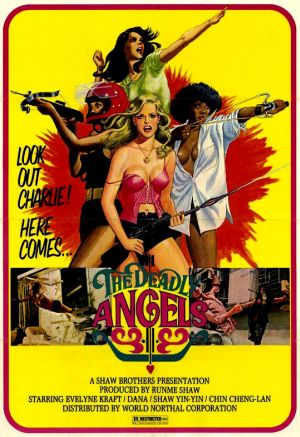 Inspired though the alternate titling of The Bod Squad might be, the original title likely gives a better idea of the inspiration for this 1977 Shaw Brothers flick: think Charlie’s rather than deadly. Three women, from Korea, Hong Kong and Japan, under the orders of Bosley Scotland Yard’s Miss Eve (Kraft, known to cult fans from Mighty Peking Man), go undercover in a night-club. Girls from there have been recruited to smuggle out of Hong Kong the proceeds from a series of brutal jewel robberies – the previous couriers all turn up stabbed to death after delivering the goods. However, the agents turn out to be a bit crap at the whole undercover thing, and the bad guys are none too happy to discover undercover operatives in their midst.
Inspired though the alternate titling of The Bod Squad might be, the original title likely gives a better idea of the inspiration for this 1977 Shaw Brothers flick: think Charlie’s rather than deadly. Three women, from Korea, Hong Kong and Japan, under the orders of Bosley Scotland Yard’s Miss Eve (Kraft, known to cult fans from Mighty Peking Man), go undercover in a night-club. Girls from there have been recruited to smuggle out of Hong Kong the proceeds from a series of brutal jewel robberies – the previous couriers all turn up stabbed to death after delivering the goods. However, the agents turn out to be a bit crap at the whole undercover thing, and the bad guys are none too happy to discover undercover operatives in their midst.
The main problem is, this takes way to long to get to the action. Outside of a pretty decent training sequence, there’s very little to speak of for the first hour. The film tries to make up in sex, what it doesn’t deliver in violence, with plenty of nudity and coercive sex, but the only point of note is an impressive death by fire extinguisher, inflicted on a witness by the chief villain’s main squeeze (Shaw Yin Yin, one of the decade’s leading erotic actresses in Hong Kong).
Things do perk up in the final reel, with a series of pretty decent battles, in which the girls take on a host of minions, with a little help from Li (Liu), whose father was the one who got “extinguished” (and who, like most Hong Kong martial artists of the time, appears to be trying to channel the very busy spirit of the late Bruce Lee). The agents also have some neat gadgets, such as a belt-buckle that become a spiked yo-yo kind of weapon, a folding cross-bow and a hair scrunchie which forms part of an explosive slingshot. More of these being put to use, and less of victims being slapped around, would have upped the entertainment quotient. You can see the influence this would have on 80’s entries in the genre, but at this point, we’re still talking “barely crawled out of the sea” in evolutionary terms.
Dir: Hun Choi, Hsueh Li Pao
Star: Nancy Yen, Dana, Liu Yang, Evelyn Kraft





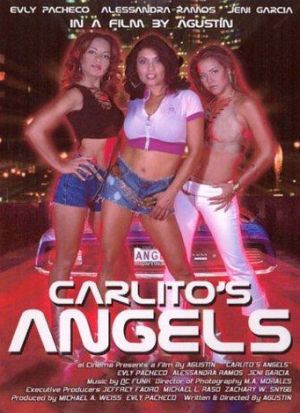 In many ways, this is wretched beyond belief, crippled by near non-existent production values and likely only to appeal to those who live in the urban culture depicted. And yet… For every moment of wince-inducing idiocy [Agustin appears to be a big fan of Benny Hill, using speeded-up footage for “humourous” effect more than once], there were moments of surreal charm. For instance, “Captions for the Hispanic-impaired,” or the really terrible fight scene which breaks the fourth wall, turning into a “making of” segment which (and I can attest to this) accurately depicts the hell of being a microbudget moviemaker. Or that the large family of children belonging to one of the Angels includes a bearded midget. “He just showed up one day. Hey, he buys groceries, it’s cool” is her casual explanation.
In many ways, this is wretched beyond belief, crippled by near non-existent production values and likely only to appeal to those who live in the urban culture depicted. And yet… For every moment of wince-inducing idiocy [Agustin appears to be a big fan of Benny Hill, using speeded-up footage for “humourous” effect more than once], there were moments of surreal charm. For instance, “Captions for the Hispanic-impaired,” or the really terrible fight scene which breaks the fourth wall, turning into a “making of” segment which (and I can attest to this) accurately depicts the hell of being a microbudget moviemaker. Or that the large family of children belonging to one of the Angels includes a bearded midget. “He just showed up one day. Hey, he buys groceries, it’s cool” is her casual explanation.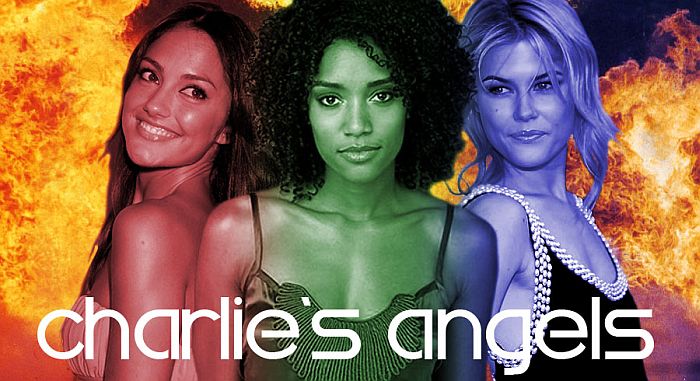
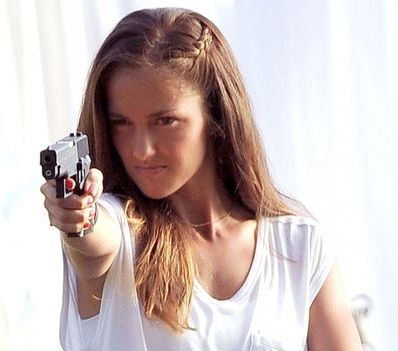 It could perhaps have withstood these barbs, if it hadn’t been for the poor ratings. 8.76 million viewers watched the Sept. 22 premiere, leaving it third in the timeslot, with less than half the audience for CBS and Fox’s offerings. That was disappointing enough, but it lost 19% of its audience the following episode, and by week three, it was down below six million. The death-knell was that, among the 18-49 year old demographic key to advertisers, Angels was on a mere
It could perhaps have withstood these barbs, if it hadn’t been for the poor ratings. 8.76 million viewers watched the Sept. 22 premiere, leaving it third in the timeslot, with less than half the audience for CBS and Fox’s offerings. That was disappointing enough, but it lost 19% of its audience the following episode, and by week three, it was down below six million. The death-knell was that, among the 18-49 year old demographic key to advertisers, Angels was on a mere 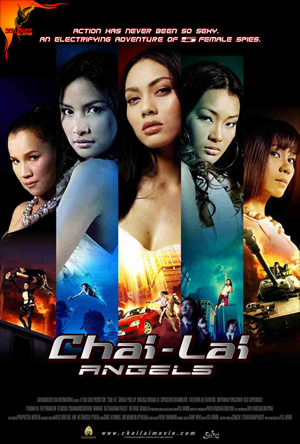 66% extra free! That’s the major difference here, as five, rather than three, little girls, who get their orders from an unseen “boss” and his faux Bosley, take on a variety of disguises and kick butt, in between romantic dalliances. Of course, with a budget approximately one-eightieth of the Hollywood version, certain economies have to be expected. But there are unexpected bonuses in the lunatic invention department, such as the when the villainous henchmen drops a cage, out of nowhere, onto four of our Angels, only for the fifth to come to their rescue, for no apparent reason either, in a
66% extra free! That’s the major difference here, as five, rather than three, little girls, who get their orders from an unseen “boss” and his faux Bosley, take on a variety of disguises and kick butt, in between romantic dalliances. Of course, with a budget approximately one-eightieth of the Hollywood version, certain economies have to be expected. But there are unexpected bonuses in the lunatic invention department, such as the when the villainous henchmen drops a cage, out of nowhere, onto four of our Angels, only for the fifth to come to their rescue, for no apparent reason either, in a 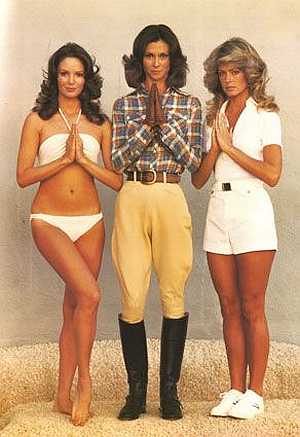 I suppose my main surprise is how pedestrian this was. Action? Hardly anything to speak of at all, despite the credit sequence which shows them training as police officers. The story has them going undercover at a vineyard, whose owner vanished seven years ago, and is about to be declared legally-dead: his ex-wife (Muldaur) and the sleazy foreman will clean up…unless the daughter, also missing, shows up. Of course, the Angels play both a fake daughter (Smith) and the ‘real’ thing (Jackson) – the former is designed to be exposed, in order to get herself involved with the wife and foreman, and reveal what’s going on. Quite cunning, really.
I suppose my main surprise is how pedestrian this was. Action? Hardly anything to speak of at all, despite the credit sequence which shows them training as police officers. The story has them going undercover at a vineyard, whose owner vanished seven years ago, and is about to be declared legally-dead: his ex-wife (Muldaur) and the sleazy foreman will clean up…unless the daughter, also missing, shows up. Of course, the Angels play both a fake daughter (Smith) and the ‘real’ thing (Jackson) – the former is designed to be exposed, in order to get herself involved with the wife and foreman, and reveal what’s going on. Quite cunning, really.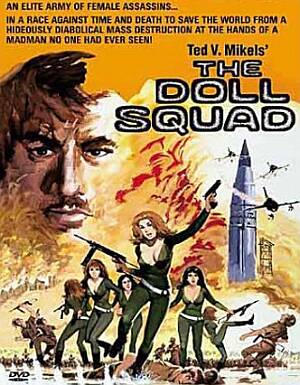 To describe this as eagerly anticipated would be… well, wholly wrong, actually. I’ll tell you how long the DVD has sat on our shelf: I bought it on
To describe this as eagerly anticipated would be… well, wholly wrong, actually. I’ll tell you how long the DVD has sat on our shelf: I bought it on 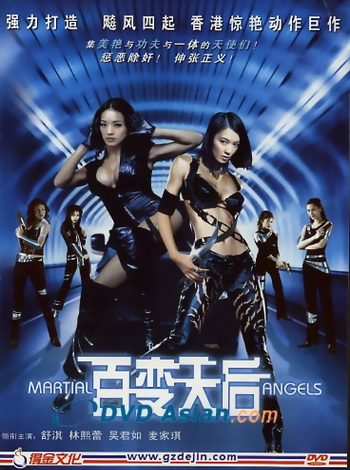
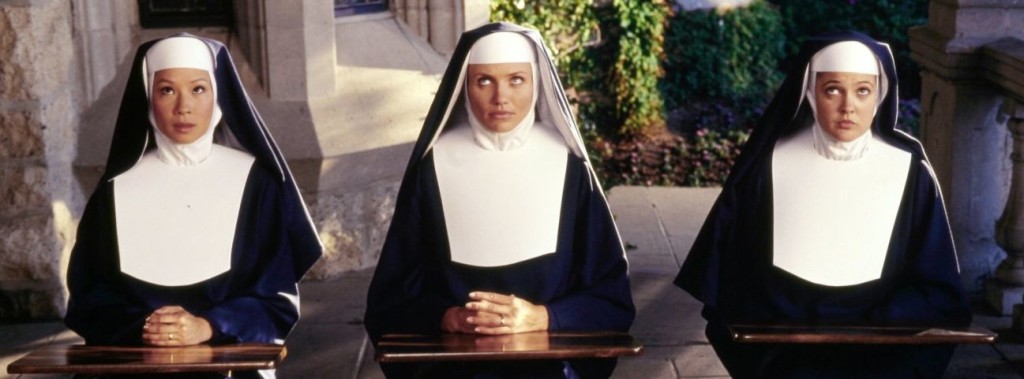
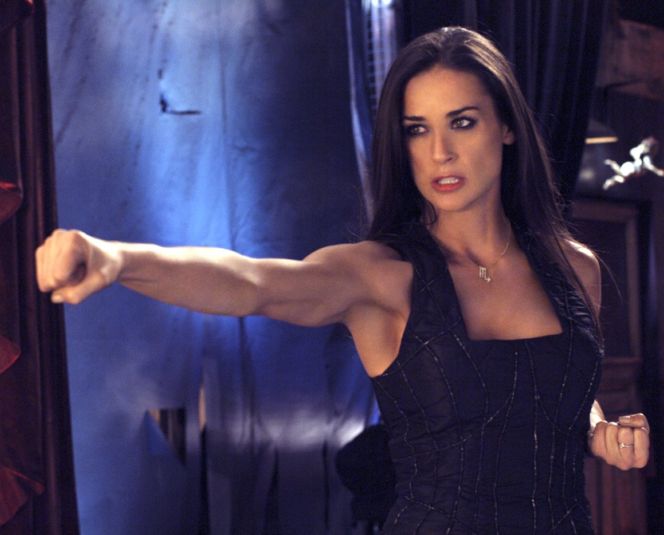
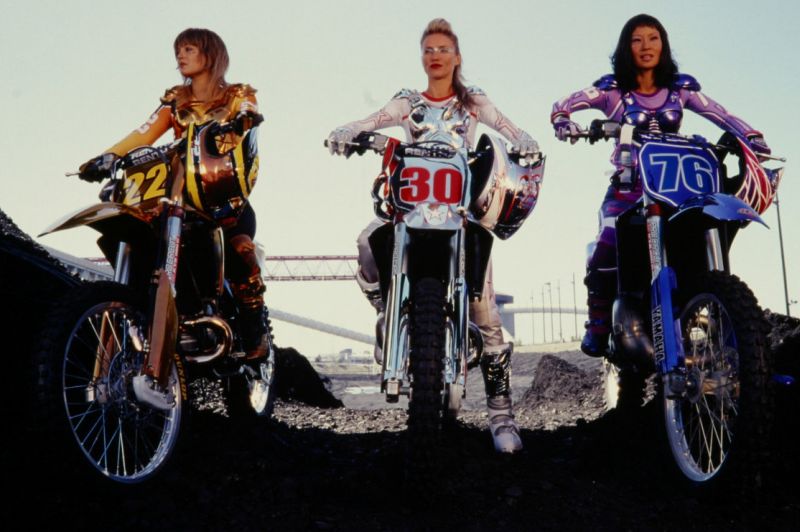
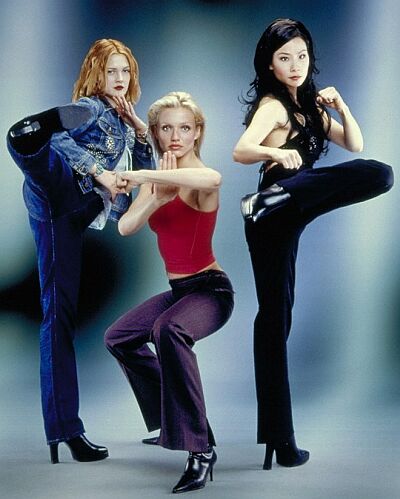
 Making movies based on a TV show is always fraught with danger. You’ve got to convince the audience to pay good money to see the same thing they can watch for free at home, yet you can’t stray too far from the central concept, or you’ll alienate the fans. One possible countermeasure is to go for an old show, less likely to have a rabid fanbase, which you can update safely. Yet this too is problematic: anyone see The Mod Squad?
Making movies based on a TV show is always fraught with danger. You’ve got to convince the audience to pay good money to see the same thing they can watch for free at home, yet you can’t stray too far from the central concept, or you’ll alienate the fans. One possible countermeasure is to go for an old show, less likely to have a rabid fanbase, which you can update safely. Yet this too is problematic: anyone see The Mod Squad?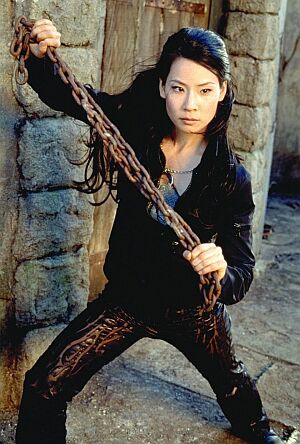 If there’s nothing there to keep you interested, the film makes up for it in lots of other ways. The aim was to make it seem like turning pages of a comic-book, and this certainly succeeds – there’s always something going on. While the nods to political correctness are kinda irritating (the villain and all his henchmen can muster precisely one gun between them), no-one is really taking it seriously, and the tongue-in-cheek approach saves the whole thing. The supporting cast are good, too: Bill Murray as their overseer is his usual laconic self, while Kelly Lynch and Crispin Glover give good support to Sam Rockwell.
If there’s nothing there to keep you interested, the film makes up for it in lots of other ways. The aim was to make it seem like turning pages of a comic-book, and this certainly succeeds – there’s always something going on. While the nods to political correctness are kinda irritating (the villain and all his henchmen can muster precisely one gun between them), no-one is really taking it seriously, and the tongue-in-cheek approach saves the whole thing. The supporting cast are good, too: Bill Murray as their overseer is his usual laconic self, while Kelly Lynch and Crispin Glover give good support to Sam Rockwell.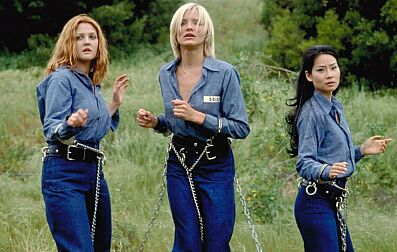 The pacing is a little weird though; apart from one impressive battle between the trio and Crispin Glover in a back-alley (to the tune of the Prodigy’s Smack My Bitch Up), all the martial arts is concentrated in one 20-minute span near the end. At one point we have Cameron Diaz taking on Kelly Lynch, Lucy Liu going toe-to-toe with Glover and Drew Barrymore taking on a whole roomful at virtually the same time, and the cross-cutting does get a little aggravating. Barrymore’s battle is very show-offish: she tells her opponents what she’s going to do, pauses in mid-stream to name the fighting techniques, and moonwalks out of there when she’s done. A tap on the wrist and a warning
The pacing is a little weird though; apart from one impressive battle between the trio and Crispin Glover in a back-alley (to the tune of the Prodigy’s Smack My Bitch Up), all the martial arts is concentrated in one 20-minute span near the end. At one point we have Cameron Diaz taking on Kelly Lynch, Lucy Liu going toe-to-toe with Glover and Drew Barrymore taking on a whole roomful at virtually the same time, and the cross-cutting does get a little aggravating. Barrymore’s battle is very show-offish: she tells her opponents what she’s going to do, pauses in mid-stream to name the fighting techniques, and moonwalks out of there when she’s done. A tap on the wrist and a warning